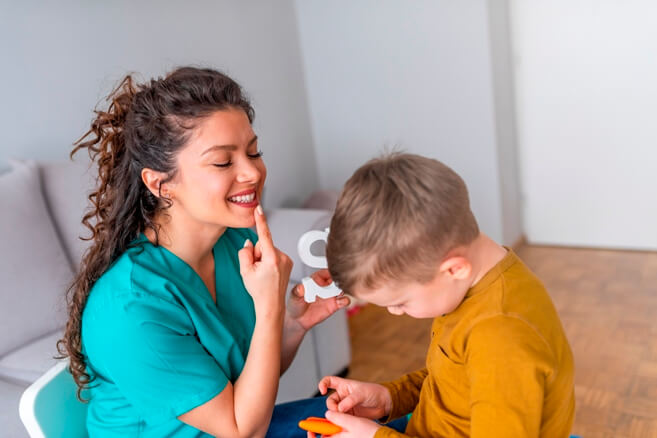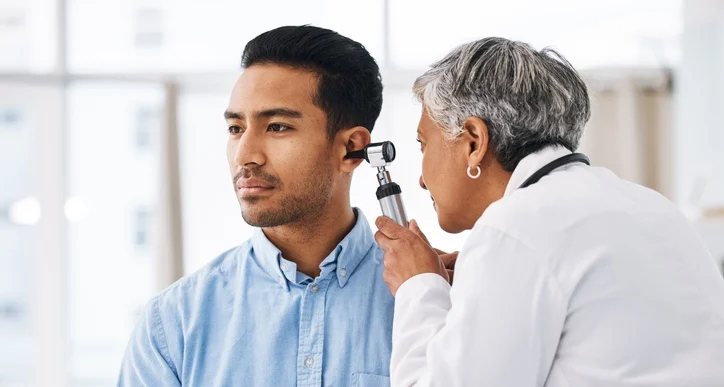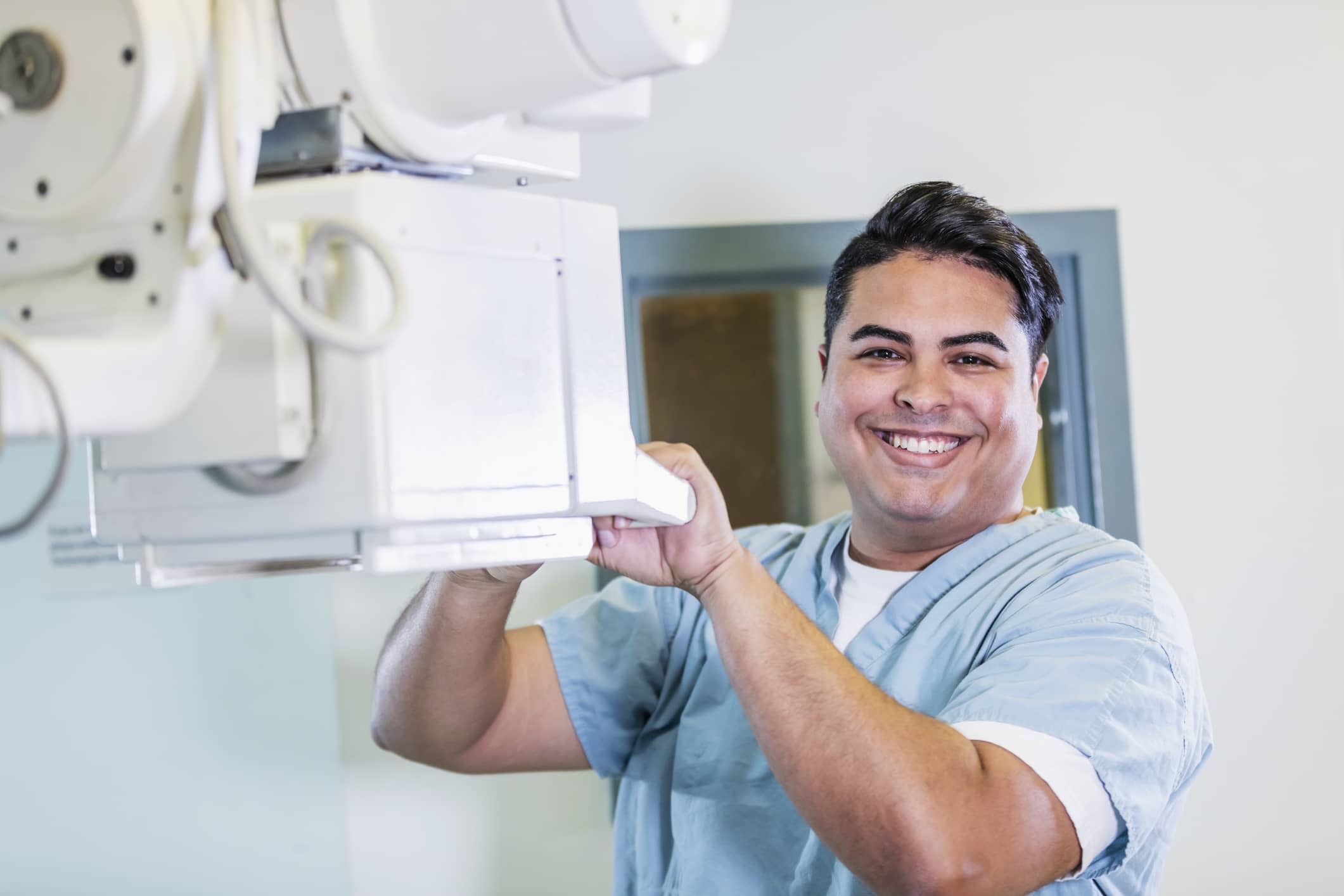
SLPs and Autism: How Do Speech-Language Pathologists Help?
Speech-language pathologists treat people who have speech, language, swallowing and feeding disorders. While their practice is wide ranging, including patients with traumatic brain injury and dementia, SLPs and autism spectrum patients also work together frequently.
People on the autism spectrum often have difficulties with communication, such as producing and understanding speech, interpreting body language and having conversations.
"Speech-language pathologists are a part of the interdisciplinary team of professionals that work with people with autism," explains Kacy Wickerson, an SLP and owner of Teach Speech. "A major focus of our therapy is in the area of social communication and interaction."
SLP and Autism Communication Challenges
SLPs see a wide range of communication and speech-related difficulties when treating people with autism. Some patients can speak fluently and talk about specific topics in detail, but they have problems with conversation. Others struggle with language, and up to one-third are nonverbal.
Some of the challenges experienced by people with autism include:
- Responding to their name or when someone is speaking to them
- Understanding the meaning of what is being said
- Interpreting nuances such as tone, facial expressions, body language and hand gestures
- Keeping conversations on topic
- Making eye contact or listening to another person
- Expressing thoughts and needs using words
How an SLP Can Help
A speech-language pathologist evaluates a patient's abilities and needs, creating a detailed treatment plan to improve communication and day-to-day functioning. Patients may receive therapy directly from an SLP or a speech therapy assistant supervised by an SLP.
Here are some of the skills related to SLP and autism that a treatment plan may focus on:
- Developing pre-language skills in young children to prevent further developmental delays
- Making sounds and learning words and phrases
- Controlling voice and tone
- Speaking fluently
- Taking turns speaking and staying on topic
- Responding to questions
- Understanding nonverbal skills such as facial expressions, gestures and body language
- Strengthening neck, mouth and jaw muscles
- Swallowing and feeding
Specific Ways SLPs Hlep People with Autism
Early Intervention
Autism can affect people of any age, but it usually appears in the first two years of life. Early intervention by professionals between birth and the age of three can have a significant impact on a child's development, according to the CDC.
"We are able to treat [people with autism] in speech therapy prior to an official diagnosis," says Wickerson. "Having been trained in this area, we are also able to assess and officially diagnose autism."

Augmentative And Alternative Communication
While some people with autism can develop verbal and language skills, others may need to learn alternate means of communication. Depending on the individual, SLPs can teach patients how to use:
- Sign language
- Picture boards or cards
- Electronic devices that produce speech
- A speech app on a tablet or other device
Social Skills
SLPs can work with patients individually or in group settings. Some therapies focus on helping people with autism learn to get along with others, make friends or understand appropriate behavior at work and in other environments. These skills may be practiced in group settings, school or in the community.
Qualifications of SLPs
Speech-language pathologists are trained to work in the area of SLP and autism. They typically have a master's degree from an accredited education institution and a Certificate of Clinical Competence (CCC) from the American Speech-Language-Hearing Association.
After earning a CCC, a speech-language pathologist can work toward additional certifications as a Board Certified Specialist. This demonstrates expertise in areas such as:
- Child Language (BCS-CL)
- Fluency (BCS-F)
- Swallowing and Swallowing Disorders (BCS-S)
SLPs provide patient services in schools, homes and residential care or nursing facilities. They also work in clinics with physical and occupational therapists, audiologists and other specialists.
Job Opportunities for SLPs
The job outlook for speech-language pathologists is excellent. Jobs are expected to grow by 27% from 2018 to 2028, not only because of SLP and autism, but due in part to an aging population needing treatment because of strokes and dementia. SLPs "who are willing to relocate will have the best job opportunities," according to the Bureau of Labor Statistics.
If you want to enjoy rewarding opportunities for speech-language pathologists without permanently relocating, consider short-term travel assignments that let you choose where you want to work. AMN has opportunities for SLPs across the country.
Sign up for job alerts in AMN Passport learn about travel SLP jobs as soon as they're posted or browse open jobs available now at AMN Healthcare.
Additional Allied Travel Resources
While you continue your search for the perfect allied healthcare position, AMN Healthcare provides great resources to keep your career moving in the right direction. Begin the application process now, and then learn more about how AMN Healthcare can help you keep your career on the move.
- EAP: Our allied travelers gain access to a valuable set of Employee Assistance Program benefits.
- Allied Travel Jobs by Specialty: Explore allied jobs and learn about hourly salaries and the benefits of working in travel jobs.
- Search All Allied Jobs: Uncover new possibilities in your allied career by exploring both short and long-term options.
- Allied Healthcare Jobs: Learn how we can help move your career in amazing directions, both professionally and geographically by exploring opportunities by each state.
- More Allied Resources: Use the content here to learn everything you need to know about our allied recruitment process, including information on salary and benefits.
Latest News
Exploring OBGYN Subspecialties: Which Path is Right for You?
One of the most exciting aspects of becoming an OBGYN is the opportunity to pursue subspecialties that align with your professional goals, personal interests, and lifestyle preferences.
Screening Guidelines Every Family Medicine Physician Should Follow in 2025
For 2025, significant updates have been made to emphasize personalized medicine, technological advancements, and population-specific needs.
Otolaryngologist Salary Outlook 2025
For otolaryngologists, also known as ears, nose, and throat (ENT) specialists, salary trends reveal not only the growing demand for their expertise but also the evolving dynamics of healthcare
Preparing for Match Week: How to Create Your Rank Order List
Match Week is one of the most exciting—and nerve-wracking—moments in a medical student's life. It's the culmination of years of hard work, perseverance, and ambition, where students
Key Skills for Success in Child and Adolescent Psychiatry
Child and adolescent psychiatry is a deeply rewarding yet multifaceted field that requires a unique blend of clinical expertise, empathy, and communication. These young patients often exhibit
How Much Does a Rheumatologist Make?
On average, salaries for pediatric rheumatologists range from $180,000 to $210,000 per year, according to Salary.com and other healthcare industry sources.
Psychologist Salary Guide 2025
Psychologists—whether employed in schools, healthcare, or independent practice—continue to experience solid demand across the U.S. According to Salary.com the average psychologist
Radiologist Salary Guide for 2025 and Specialties
Whether you're considering permanent employment, pursuing locum tenens work, or exploring subspecialties like Diagnostic Radiology, Vascular & Interventional Radiology, or Mammography, this











